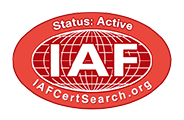ISO Certification in Tunisia
ISO certification in Tunisia is essential for businesses to establish trust and reliability. It proves commitment to high standards, continuous improvement, and compliance. It enhances reputation, customer satisfaction, and chances of winning tenders. It also minimizes risks and improves overall performance for long-term success.
Why select us for ISO certification in Tunisia?
Veritas Assurance, an esteemed conformity assessment, holds international recognition for providing accredited certifications to organizations that meet essential standards. We take pride in our role of assisting numerous companies in attaining certification and achieving their objectives by showcasing adherence to global regulations.
When it comes to selecting Veritas Assurance for your ISO certification in Tunisia, there are multiple compelling reasons. Foremost, we possess extensive experience and expertise in the ISO certification process. Our team of knowledgeable professionals can efficiently guide you through the certification journey. Furthermore, our familiarity with the Moroccan market enables us to adeptly navigate the specific requirements for obtaining ISO certification.
Benefits of an ISO Certification in Tunisia
Obtaining an ISO certification in Tunisia can provide numerous benefits for an organization.
- Improved customer satisfaction
- Increased market share
- Higher profitability
- Improve the quality of their products and services
- Regulatory compliance
- Boost customer confidence
- Increase your sales
Requirements of an ISO Certification in Tunisia
- Create a management plan. Decide on your primary business processes.
- Implement your plan. Make sure that the procedures are carried out exactly as they are outlined in your documentation.
- Analyze the performance of your system.
- Prepare your system.
FAQ
1. How do I get ISO Certification in Tunisia?
1. How do I get ISO Certification in Tunisia?
There are a few things that you need to do to get ISO Certification in Tunisia. First, you need to find an organization that is accredited by the International Organization for Standardization (ISO). Once you have found an accredited organization, you need to contact them and inquire about their certification process. The organization will likely have a website that outlines its certification process. Finally, once you have followed the specified steps and paid the required fees, you will be awarded your ISO Certification.
2. How long does it take to get an ISO Certification in Tunisia?
It typically takes between 6 and 12 months to implement ISO certification in Tunisia This timeframe can vary depending on the size and complexity of the organization, as well as the availability of resources. Organizations should consult with a certified ISO consultant to ensure a successful implementation.
3. What is the Cost of ISO Certification in Tunisia?
The cost of ISO certification varies depending on the organization's size, industry, and number of locations. At Simple Certifications, we're dedicated to having a clear pricing structure and offering you quotes that are affordable. This will help you plan your budget for your ISO Certification requirements. Please enter your information HERE to get more information about our prices.
4. Who needs ISO Certification in Tunisia?
ISO Certification is important for all Tunisia organizations regardless of size or sector. It improves credibility, reputation, and quality. Particularly useful for businesses in manufacturing, construction, healthcare, education, and finance, and mandatory for some in food processing and storage. ISO Certification provides a competitive edge, more clients, and increases operational efficiency, making it vital for many businesses in Tunisia.
5. Why is ISO Certification in Tunisia important for an organization?
ISO Certification in Tunisia is a globally recognized credential that adds value to the company's goods and services. Companies can benefit from being certified with ISO Standards like ISO 9001 and ISO 27001, among others, including but not limited to;
- Enhanced Reputation and Acceptance
- Higher Revenues
- Enhancing Consistency
- Improved client satisfaction
- Employees with Power



























_ Logo.jpg)




























